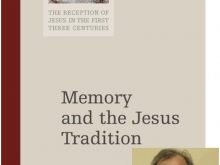Jan Vansina and the Criterion of Embarrassment
Insults and a failure to comprehend Awhile back our favorite historicist doctor posted a comment on his own blog: One can see a similar mythicist combination of insult and failure to comprehend those with whom they disagree at the blog Vridar. Seriously, it is as though I had never written anything about [Jan] Vansina and … Continue reading “Jan Vansina and the Criterion of Embarrassment”
